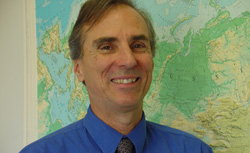Brian Tucker, President of GeoHazards International
Working with local communities to prevent natural disasters from becoming national catastrophes.
In 1988, an earthquake struck Armenia, killing at least 25,000 people. A year later, an equivalent quake struck California, killing 63 people. Those numbers told Brian Tucker, a seismologist in charge of geological hazards programs in the California Geological Survey, that he was working in the wrong place. Good construction and preparedness saved lives in California. They could do the same in the developing world.
So Tucker founded GeoHazards International. His message was simple: Stop thinking of earthquakes and tsunamis as unpredictable, and stop thinking of mass fatalities as inevitable. We know where the faults are, we can estimate when quakes will hit, and we can see trends in shoddy construction. The math says more than two million people will die in this century. But those deaths can be prevented, just as vaccines prevent disease. Instead of waiting to send disaster relief after the next Haiti, fund better construction now. Instead of waiting for the next epidemic, inoculate the world.
GHI has worked in more than 40 countries. Its strategy is to create a self-sustaining culture and industry of quake mitigation. It trains masons to build sound structures with affordable materials. It uses demonstration projects, such as retrofitting seismically vulnerable schools, to get local people talking. The masons train other masons, word spreads about the new methods, and the network expands from village to village.
Tucker doesn't apply the same solutions from country to country. He works with the problems and people he finds. In Padang, Indonesia, GHI learned that in a tsunami scenario, traffic congestion blocked people from evaculating inland to safe ground. So it devised a plan to evacuate people vertically instead of horizontally, by building elevated parks.
Beyond GHI's current projects, Tucker wants a global commitment to fund disaster mitigation the way we fund vaccination. Ten percent of the money raised after a disaster such as Haiti should be used to save lives in the next quake by mapping geologic hazards, training builders, and teaching safety practices. Relief funds, foreign aid, and investments should include construction standards. And local professionals should be hired so that when the relief groups leave, the expertise in building and preparedness lives on.
To learn more about Tucker's work and what can be done to save lives in future natural disasters, watch his speech to the World Affairs Council of Northern California.
Check out the rest of our technology Top Right:
Cynthia Breazeal, director of the Personal Robots Group at the MIT Media Lab.
Jeff Bezos, founder and CEO of Amazon.com.
David Ferrucci, lead researcher for IBM's Watson project.
Salman Khan, founder of Khan Academy.


